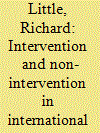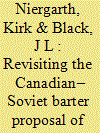|
|
|
Sort Order |
|
|
|
Items / Page
|
|
|
|
|
|
|
| Srl | Item |
| 1 |
ID:
124134


|
|
|
|
|
| Publication |
2013.
|
| Summary/Abstract |
In this article I utilise the editors' conceptual frame of sovereignty/intervention/transnational social forces to argue that the relationship that ensues between these phenomena has to be understood in colonial-modern - rather than modern - terms. I thereby argue that intervention is a distinctive technology of colonial-modern rule, specifically, one that erects and polices the difference between sovereign and quasi-sovereign entities via a standard of civilisation. Additionally, I argue that transnational social forces struggle - cognitively, socially, and politically - over the upholding or refuting of this standard; and in this struggle, some might even defend particular sovereign entities against colonial interventions. I demonstrate my argument by explicating the global colonial context of the Italy/Ethiopia conflict in 1935-6, the nadir of the interwar crisis. I 'decolonise' received interpretations of the conflict through the heuristic of two differing catechisms of Psalms 68:31 proffered at the time: one, invoking a civilising mission of Africans; the other, invoking a project of self-liberation by Africans.
|
|
|
|
|
|
|
|
|
|
|
|
|
|
|
|
| 2 |
ID:
124133


|
|
|
|
|
| Publication |
2013.
|
| Summary/Abstract |
This article aims to show that from the end of the eighteenth century, international order began to be defined in terms of ground rules relating to non-intervention and intervention, with the former being prioritised over the latter. After the Napoleonic wars, within continental Europe there was an attempt to consolidate an intervention ground rule in favour of dynastic legitimacy over the right of self-determination. By contrast, the British and Americans sought to ensure that this ground rule was not extended to the Americas where the ground rule of non-intervention was prioritised. During the nineteenth century, it was the Anglo-American position which came to prevail. Over the same period international order was increasingly bifurcated with the non-intervention ground rule prevailing in the metropolitan core and with the intervention ground rules prevailing in the periphery. This article, however, only focuses on the metropolitan core and draws on two case studies to examine the non-intervention ground rule in very different circumstances. The first examines the British response to the American Civil War in the 1860s during an era of stability in the international order. The second explores the British Response to the Spanish Civil War in the 1930s when the international order was very unstable and giving way to a very different international order.
|
|
|
|
|
|
|
|
|
|
|
|
|
|
|
|
| 3 |
ID:
183743


|
|
|
|
|
| Summary/Abstract |
The article is a study of the reception of antisemitism, and its appeal among Turkish nationalists and state elites in the 1930s and 1940s. Based on a closed reading of the investigation of İnkılâp, the first antisemitic journal published in Turkey, by state bureaucrats in 1933, the article argues that antisemitism in the 1930s offered Turkish nationalist actors of competing convictions a tool to legitimize contending versions of Turkish nationalism, as well as a novel language to legitimize already existing antiminority practices explicitly against local Jews. Nationalist actors could thus discriminate against Turkish Jews without reference to religious difference. Finally, this study has detected an increased input of European post-First World War European antisemitism, especially the German post-Versailles conspiratorial ‘stab-in-the-back’ antisemitic theme and argues that this association had been facilitated by the increased relations between the Ottoman Empire/Turkey and Germany since the late nineteenth century.
|
|
|
|
|
|
|
|
|
|
|
|
|
|
|
|
| 4 |
ID:
181093


|
|
|
|
|
| Summary/Abstract |
This paper aims to clarify the scope and limitations of the ideals of Pan-Maghrib nationalism as developed by the Association of North African Muslim Students in France (AEMNAF) in the 1930s. The AEMNAF members’ inclination toward sciences and technology and their emphasis on conserving their mother culture made them consider Arabism and Islam their most important identity markers. Moreover, the AEMNAF created a sense of solidarity among Maghribi students in France and extended its social influence by cooperating with French and Mashriqi opinion leaders in Europe. However, the AEMNAF's narrow definition of Muslim-ness and its elitist nature led to the exclusion of Maghribis with French citizenship from the organization. The dualistic view of technology and culture in Maghribi nationalist thought also contributed to prioritizing Francophones over Arabophones, Muslims over non-Muslims, men over women, and students in the sciences over those in humanities.
|
|
|
|
|
|
|
|
|
|
|
|
|
|
|
|
| 5 |
ID:
139607


|
|
|
|
|
| Summary/Abstract |
The 1930s Depression caused an enormous growth in urban poverty in colonial Java. Informal neighbourhood networks could no longer cope with the unemployed, the homeless and the destitute. Politically conscious Indonesians were convinced that the colonial state was concerned only with poverty among Europeans. They responded by creating new charities focused on the Indonesian lower classes. Many provided middle-class women with opportunities for leadership denied them in the political and labour movements. However, those who managed the charities had no concept of empowering the poor. In dispensing support they made a clear distinction between the deserving and the undeserving poor. Nevertheless their charitable work enabled thousands of Indonesians to survive the Depression years.
|
|
|
|
|
|
|
|
|
|
|
|
|
|
|
|
| 6 |
ID:
147849


|
|
|
|
|
| Summary/Abstract |
In the autumn of 1932, when Canada had massive agricultural surpluses and hunger was afflicting millions of Soviet citizens, a proposal to trade Canadian cattle for Soviet fuels attracted considerable public support. Negotiated by a syndicate of Canadian businessmen, the cattle–oil barter deal was initially stalled because Conservative prime minister R.B. Bennett was ideologically opposed to it. Soviet documents suggest that this was not the end of the story. Revisiting the cattle–oil barter in light of these documents complicates current accounts of Canadian–Soviet relations in this period and raises questions about the Bennett government’s attitude to international trade and sensitivity to the kind of public pressure exerted by the proposal’s many Canadian supporters. In spite of major obstacles, the potential mutual benefit of the project nearly overcame ingrained mutual distrust.
|
|
|
|
|
|
|
|
|
|
|
|
|
|
|
|
|
|
|
|
|